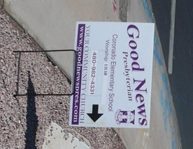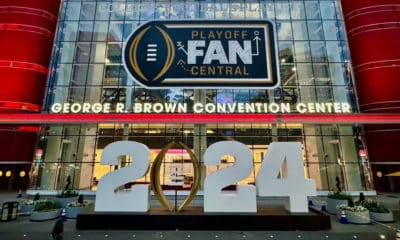On July 1, the Supreme Court of the U.S. (SCOTUS) agreed to hear the case of Reed v. Town of Gilbert. The plaintiff in the case, Clyde Reed, is pastor of Good News Community Church, a small, non-denominational house of worship, formerly located in Gilbert, that’s since moved to Chandler, a neighboring town. When the church was still meeting in Gilbert, Reed set out stake-mounted, portable signs to advertise services, but was notified that the city limited placement of signs promoting religious-organization events to 12 hours before through one hour after an event, with a 6-sq.-ft. maximum.
However, the town’s ordinance permitted homeowners’ association signs to be up to 80 sq. ft., political signs up to 32 sq. ft., and ideologically related signs a 20-sq.-ft. maximum – without the time limitations.
Reed sued to rescind Gilbert’s sign law, but a federal judge refused to grant an injunction to block the ordinance. He enlisted Alliance Defending Freedom (ADF), a Scottsdale, AZ-based organization that advocates for organizations’ religious freedom, to argue his case. Reed and ADF took the case to the 9th Circuit Court in San Francisco, which decided the regulations were content-neutral. The Washington Post offered an exhaustive treatise on the First Amendment implications of the Reed case.
Subsequently, U.S. District Judge Susan Bolton granted the town summary judgment, and the 9th Circuit reaffirmed the decision last year. However, Paul Watford, who offered a dissenting opinion in the second 9th Circuit decision, contended “content-based distinctions among different categories of non-commercial speech” violate the 1st and 14th Amendments”, according to a Courthouse News Service report.
In a July 1 East Valley Tribune article, David Cortman, ADF’s senior counsel, said, “Towns can’t apply stricter rules to church signs when it doesn’t apply them to ideological, political, and noncommercial signs. The 9th Circuit’s decision is out of step with the Constitution and the decisions of other circuits, so we hope for the Supreme Court to reverse this decision.”
Any case that reaches the SCOTUS carries considerable complexity, which I’ll address in the September issue’s Editorially Speaking column. According to the Tribune article, judges are expected to hear arguments pertaining to the Reed case this fall. Whichever way the court rules, it’s likely to impact the concept of content neutrality in signage, and the organizations’ commercial- and institutional-speech rights.
Advertisement


 Photo Gallery4 days ago
Photo Gallery4 days ago
 Tip Sheet2 weeks ago
Tip Sheet2 weeks ago
 Ask Signs of the Times6 days ago
Ask Signs of the Times6 days ago
 Paula Fargo2 days ago
Paula Fargo2 days ago
 Real Deal2 weeks ago
Real Deal2 weeks ago
 Benchmarks1 week ago
Benchmarks1 week ago
 Photo Gallery2 days ago
Photo Gallery2 days ago
 Women in Signs2 weeks ago
Women in Signs2 weeks ago












